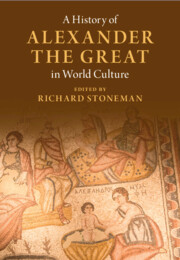Book contents
- A History of Alexander the Great in World Culture
- A History of Alexander the Great in World Culture
- Copyright page
- Contents
- Figures
- Notes on Contributors
- Preface
- Abbreviations
- 1 Introduction
- 2 Alexander and Alexandria in Life and Legend
- 3 The Image of Alexander in Ancient Art
- 4 Alexander, Philosophy and Rome
- 5 Christianising Alexander Traditions in Late Antiquity
- 6 Alexander in Ancient Jewish Literature
- 7 The Medieval Alexander
- 8 Alexander the Great and the Crusades
- 9 The Slavic Alexander
- 10 Alexander the Great in Byzantine Tradition, AD 330–1453
- 11 The Spanish Alexander
- 12 The Persian Alexander (1)
- 13 The Persian Alexander (2)
- 14 Alexander in Medieval Arab Minds
- 15 Alexander in the Age of Shakespeare
- 16 Alexander the Great in Opera
- 17 Alexander in the Long Eighteenth Century (c.1660–1830)
- 18 Images of Alexander in Germany
- 19 Alexander the Gay and the Gloryhole That Was Greece
- Index
- References
13 - The Persian Alexander (2)
Amir Khusraw and the Philosophical View of Alexander
Published online by Cambridge University Press: 13 January 2022
- A History of Alexander the Great in World Culture
- A History of Alexander the Great in World Culture
- Copyright page
- Contents
- Figures
- Notes on Contributors
- Preface
- Abbreviations
- 1 Introduction
- 2 Alexander and Alexandria in Life and Legend
- 3 The Image of Alexander in Ancient Art
- 4 Alexander, Philosophy and Rome
- 5 Christianising Alexander Traditions in Late Antiquity
- 6 Alexander in Ancient Jewish Literature
- 7 The Medieval Alexander
- 8 Alexander the Great and the Crusades
- 9 The Slavic Alexander
- 10 Alexander the Great in Byzantine Tradition, AD 330–1453
- 11 The Spanish Alexander
- 12 The Persian Alexander (1)
- 13 The Persian Alexander (2)
- 14 Alexander in Medieval Arab Minds
- 15 Alexander in the Age of Shakespeare
- 16 Alexander the Great in Opera
- 17 Alexander in the Long Eighteenth Century (c.1660–1830)
- 18 Images of Alexander in Germany
- 19 Alexander the Gay and the Gloryhole That Was Greece
- Index
- References
Summary
Alexander played an important role in medieval Islamic philosophy and Persian literature, serving as a vehicle for discussions of the ‘ideal king’ in Mirror for Princes literature. This chapter explores the background to one particular work, Amir Khusraw’s Mirror of Alexander (1299), in which the king consults the philosopher Plato for advice on rulership before embarking on his submarine voyage to explore the nature of the universe. Plato’s characterisation as a mystical sage is contrasted in medieval Islam with the wisdom of Aristotle, Alexander’s teacher. In Amir Khusraw as in Nizami, Alexander is as much a philosopher as a king.
Keywords
- Type
- Chapter
- Information
- A History of Alexander the Great in World Culture , pp. 288 - 307Publisher: Cambridge University PressPrint publication year: 2022
References
- 1
- Cited by

